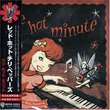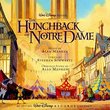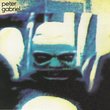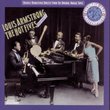| All Artists: Wagner, Norman, Tennstedt Title: Tristan Und Isolde Members Wishing: 0 Total Copies: 0 Label: Capitol Release Date: 1/12/1993 Genre: Classical Style: Opera & Classical Vocal Number of Discs: 1 SwapaCD Credits: 1 UPC: 077774975926 |
Search - Wagner, Norman, Tennstedt :: Tristan Und Isolde
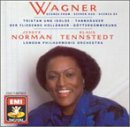 | Wagner, Norman, Tennstedt Tristan Und Isolde Genre: Classical
|
Larger Image |
CD DetailsSimilarly Requested CDs
|
CD ReviewsJessye Norman's Wagner Album American Evita | U.S. | 04/18/2008 (5 out of 5 stars) "About the Album: Jessye Norman, soprano, London Philharmonic Orchestra, Klaus Tennstedt, conductor, EMI Records, Abbey Road Studio London, Hayes Middlesex, England, 1987 using B&W speakers.
Track 1: Tristan and Isolde Prelude Track 2: Isolde's Liebestod "Love Death" Aria Tristan and Isolde finale Track 3: Dich Teure Halle Elisabeth's Greeting from Tannhauser Track 4: Allmacht'ge Jungfrau, Elisabeth's Prayer from Tannhauser Track 5: Senta's Ballad from The Flying Dutchman Track 6: Starke Scheite Brunnhilde's Immolation from Gotterdammerung finale By the mid 1980's, African-American opera singer Jessye Norman was an accomplished soprano having conquered the major opera houses of the world, including New York City's Metropolitan Opera. Her heavy, dramatic voice was rich, dark, powerful, dramatic; of the kind that endowed with mezzo soprano as well as dramatic soprano registers could easily essay the music of Richard Wagner. Early on, she took on Wagner heroine roles such as Sieglende in Die Walkure, Elisabeth in Tannhauser and Senta in Flying Dutchman. In 1987, for the first time on record, Jessye Norman performs various arias from Wagner's popular operas - Tristan, Flying Dutchman, Tannhauser and Gotterdammerung- in an exquisite, richly sung, thoughtfully orchestrated renditions; truly a Wagner fan's dream come true. Each aria here is a vocal masterpiece. Jessye's voice is still in its prime, and it's a vibrant, masterful, expressive dramatic voice the likes of which Wagnerian opera audiences had never heard before. I enjoyed this album very much (just bought it). The Tristan overture is poignant and powerful, and the London Phiharmonic is one of the major orchestral forces in the world. Here, thanks to the careful conducting by Klaus Tennstedt, the scores to each of the arias bring out rich textures and details of the orchestra that other full-length Wagner opera recordings don't touch. Tennstedt, sadly, was under the shadow of George Solti but he is an equally masterful conductor of Wagner as proven in this album. Jessy'es interpretation of Isolde's final aria, the Liebestod, is quite frankly not her best effort. Perhaps it's the recording (studios aren't perfect) or perhaps she was exhausted, but this version is not as beautiful or as impressive as the majestic Liebestod she sang for Herbert Von Karajan and the Berlin Philharmonic, available in other albums. It's bland, it's long-winded and it doesn't move the soul like other sopranos' versions. But Jessye sings a marvelous Elisabeth and her two arias - the Hall Greeting and the Prayer are examples of Jessye Norman's abilities. Fresh, passionate and nuanced, they reveal her understanding of the opera about a spiritual virgin trying to save the soul of her lover Tannhauser. Norman did not record a full length Tannhauser or Flying Dutchman but she had performed these roles on stage and in concert versions. An outstanding piece is Senta's Ballad Aria from Dutchman. My God! Such an unrivaled performance. She sings the role with melancholy neurosis and at the same time it's lyric, beautiful and wistful. This aria has never sounded more like a ballad than in the vocal chords of Ms. Norman (especially the Johohoe! Flying Dutchman's curse theme roulades) Other sopranos who have sung Senta don't come close to the endearing and poignant performance heard here, for Miss Norman inflects the aria using not only a dramatic and mature voice but a voice that captures the spiritual and tragic-romantic nature of the heroine. Finally, Jessye Norman's Brunnhilde from Gotterdammerung. She had never sung the role on stage but at this time her mature Wagnerian voice was certainly capable of taking on the Brunnhilde from Gotterdammerung, even if it was not suited for the Brunnhilde of Walkure or Siegfried. Perhaps aware that not all sopranos attain success with the role, she was careful not to sing it in its entirety. She sang the Immolation Scene in concert in New York City's Lincoln Center with the NY Philharmonic and that performance is passionate but swift and consequently more visceral and exciting. Here, owing to the studio recording and because Tennstedt was also looking to show off the orchestral magic, her rendition is slow, mannered, leisurely, but that's only true of the first portions "Starke Scheite...Mein Erbe..." before she explodes into a powerful and dramatic final moments "Grane Mein Ross!". Still, her voice matches the rich textures of the orchestra and I've never heard the little touches and motifs that swirl and fly about in this finale as Brunnhilde heroically sacrifices her life by joining her husband in the Funeral Pyre. Norman sings this with such beauty and with such a regal voice, it's thoroughly enjoyable. Fans of the diva will really enjoy this treat. To anyone with a heart, this is possibly the best sung Immolation Scene and one with the most dramatic conviction rather than just razzle dazzle like the Brunnhildes of Nilsson, Eaglen or Jones. She was very intelligent and understood the music so well that she could sing it almost as if she was singing it for the composer's gratification. It's true some critics claim that hers is not exactly a soprano voice suited to the heavy Wagner repertoire (unlike sopranos Kirsten Flagstad, Birgit Nilsson, Astrid Varnay, Jane Eaglen, Leonie Rysanek or Gwyneth Jones. Jessye's voice is considered a "Falcon" voice, a combination of dramatic soprano and mezzo soprano, hinted at by other black sopranos who never even attempted the Wagner repertoire - Leontyne Price, Shirley Verrett and Grace Bumbry, the latter who did sing the Tannhauser Venus at Bayreuth. But Jessye insists her voice is unique and one that cannot be labeled either soprano or mezzo. Frankly, it's irrelevant. It's a gifted voice, so full of spiritual and dramatic prowess, beauty and flawless diction, lyric, passionate, high, gorgeous and divine. She is the definition of a diva." |

 Track Listings (6) - Disc #1
Track Listings (6) - Disc #1